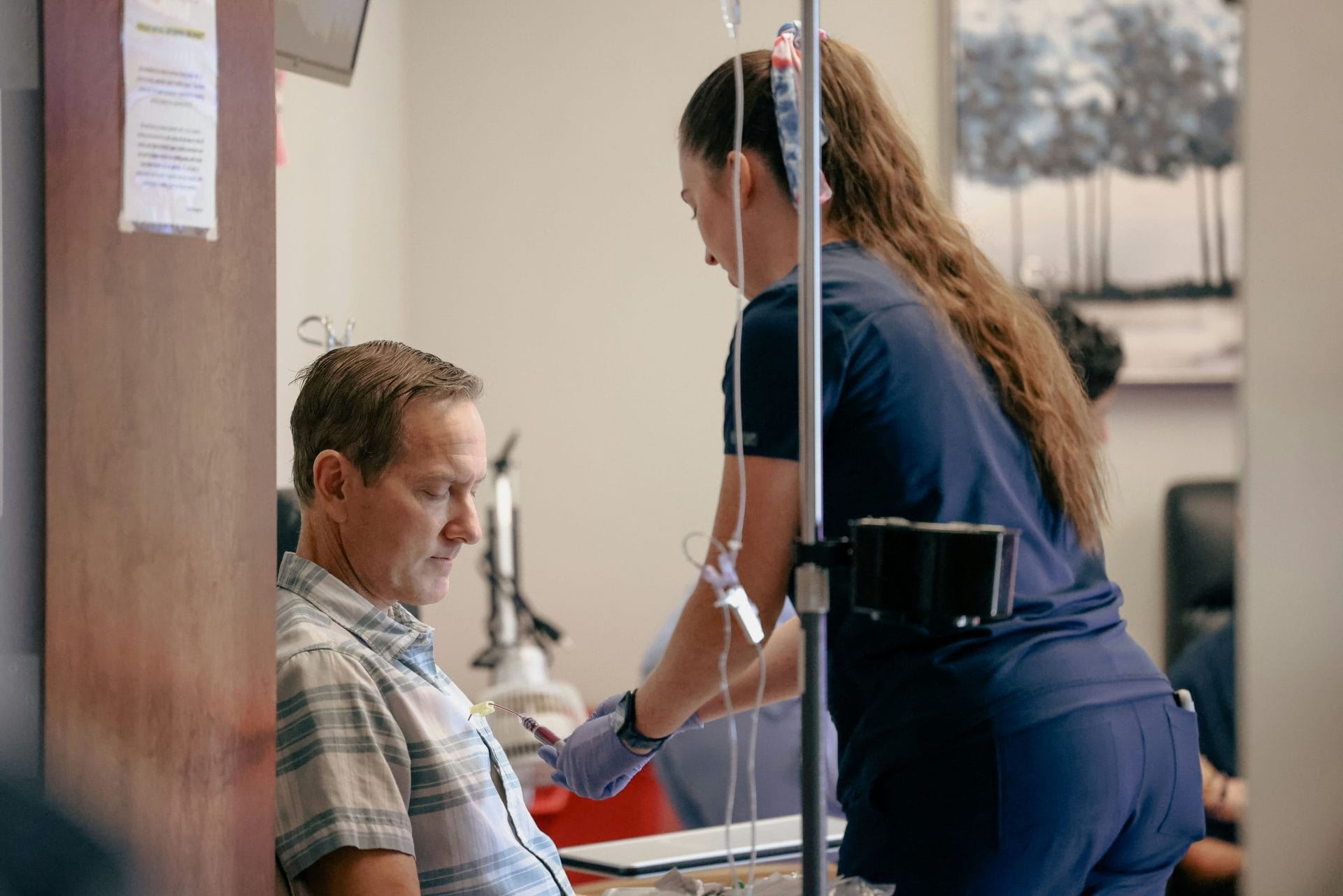Vitamin C IV Treatment
Discover the benefits of High-Dose Vitamin C IV Therapy
High Dose Vitamin C IV Treatment
Vitamin C is a water-soluble vitamin. It is an essential nutrient in our diet. It has many important roles in our body’s immune function, including wound healing, preventing damage to cells, building collagen, and producing chemical messengers called neurotransmitters.
Many people take vitamin C for general health or to boost their immune system. It’s also taken to treat vitamin C deficiency called scurvy.
Additional off-label uses include support of general health and immune function, cancer treatment, and weight loss.
Many people receive vitamin C IV therapy for convenience and immediate results. The IV means they do not have to remember to take a supplement pill each day.

The earliest experience of using high-dose IV vitamin C was by a Scottish surgeon, Ewan Cameron, and his colleague, Allan Campbell, in the 1970s.
This work led to a collaboration between Cameron and the Nobel Prize-winning chemist Linus Pauling, further promoting the potential of vitamin C therapy in cancer management.
The results clearly indicate that this simple and safe therapy is of definite value in the treatment of patients with advanced cancer.
HOW DOES VITAMIN C KILL CANCER CELLS?
We all know that Vitamin C is a powerful antioxidant with abundant benefits including immune enhancement, protection from viruses and bacteria, cardiovascular protection, eye diseases, and even skin wrinkles. What many people may not know, however, is that in high-dose IV Vitamin C, can kill cancer cells.

Put simply, Vitamin C works with metals in the body to create hydrogen peroxide. Whereas normal cells have the ability to reduce the effects of hydrogen peroxide, cancer cells do not.
The high concentration of the resulting hydrogen peroxide damages the DNA of the cancer cells cuts off their energy supply, and kills them. Vitamin C, even in very high doses, is toxic only to the cancer cells without harming the healthy cells in your body.
Opponents to the use of Vitamin C as a chemotherapeutic agent believe that it actually can protect cancer cells. However, this is only potentially true if small doses are used.
Small doses may help the cancer cells arm themselves against the free-radical induced damage caused by chemotherapy and radiation.
Only markedly higher doses of vitamin C will selectively build up as peroxide in the cancer cells to the point of acting in a manner similar to chemotherapy. These tumor-toxic dosages can only be obtained by intravenous administration.

WHAT OTHER BENEFITS DOES HIGH-DOSE IV VITAMIN C HAVE?
In addition to its benefit as a non-toxic chemotherapeutic agent, intravenous vitamin C also boosts immunity. It can stimulate collagen formation to help the body wall of the tumor.
It inhibits hyaluronidase, an enzyme that tumors use to metastasize and invade other organs throughout the body. It induces apoptosis to help program cancer cells to die early.
IF VITAMIN C FIGHTS CANCER, WHY DOESN’T TRADITIONAL MEDICINE OFFER IT?
One of the biggest hurdles is the critics pointing to the lack of controlled double-blind studies demonstrating Vitamin C’s efficacy in treating cancer. Double-blind studies are typically conducted by pharmaceutical companies.
The studies are huge undertakings and prohibitively expensive. Vitamin C is a naturally occurring nutrient that cannot be patented and, therefore, drug companies are not willing to sponsor the research. Moreover, the billion-dollar cancer drug industry does not want to prove that a naturally occurring Vitamin is more effective than their drugs.
They would be putting themselves out of business. And don’t forget, cancer is a very big business.
This is not to say that legitimate research has not been performed that demonstrates the curative effects of Vitamin C on many diseases including cancer. If you perform a search in PubMed, a government research database, you will find over 50,000 remarkable studies on Vitamin C.
We have provided links to some of these studies below so that you can read this research yourself and feel confident that substantial evidence exists supporting the use of Vitamin C in cancer treatment.
Western medicine should be ashamed of itself for ignoring this truth and depriving their patients of these benefits.
CAN ORAL VITAMIN C HELP?
Unfortunately, the answer is no. The only way to get the blood levels of Vitamin C high enough to kill cancer cells is to administer it intravenously.
Our intestinal tract limits the amount of Vitamin C we can absorb and is not tolerated by our digestive system at these levels. Even if you ingested only 10 g of vitamin C, you would only absorb approximately 5% (.5g) and would certainly develop a pretty severe case of diarrhea.
Vitamin C administered intravenously has the benefit of bypassing this control system and you absorb 100% of the intake. Moreover, it does not cause stomach upset or diarrhea.
IS HIGH-DOSE IV VITAMIN C SAFE?
Vitamin C has been used successfully for over 70 years without a single confirmed report of any dose, even a mega-dose, causing any significant harm to an individual.
Yet, according to the Journal of the American Medical Association, approximately 100,000 patients died in hospitals in 1994 from legally prescribed and carefully supervised medications and that number has remained constant every year since.
High-Dose Vitamin C IV FAQs
What is high-dose Vitamin C IV therapy?
High-dose Vitamin C IV therapy is a medical treatment that involves administering a large amount of Vitamin C directly into the bloodstream via an intravenous (IV) drip. The dose is typically much higher than what can be achieved when taking Vitamin C orally.
What are the benefits of high-dose Vitamin C IV therapy?
Studies show that high-dose Vitamin C IV therapy may help in the treatment of certain conditions like cancer, as it may have pro-oxidant effects that lead to the death of cancer cells. Other potential benefits include boosting immune function, enhancing skin health, and aiding recovery from strenuous physical activities.
Are there any risks or side effects associated with high-dose Vitamin C IV therapy?
As with any treatment, there can be risks or side effects. Some people may experience discomfort, infection, or inflammation at the injection site. Always consult your medical provider before beginning any new treatment.
Can anyone receive high-dose Vitamin C IV therapy?
While Vitamin C is an essential nutrient, not everyone is a suitable candidate for high-dose Vitamin C IV therapy. People with certain health conditions may not be suitable for this treatment. As always, consult with your medical provider before beginning any new treatment.



